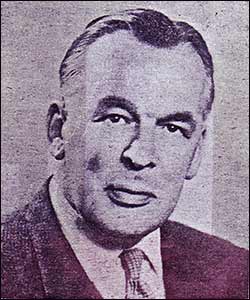|
|||
|
John Orme
|
|||
|
Engineer, Toolmaker, Businessman &
Inventor of Revolutionary Machines for the Moulding of P.V.C. |
|||
|
|||
John was born in Rugby on the 27th July 1912: at the age of 13 years he left school. His first job was in a grocery shop in Leicester: he did not like this job at all and managed to persuade his father to get him his first engineering job with S. H. Russell & Son, Leicester. In 1939 John moved to the Daimler Aero Engine factory in Coventry, eventually becoming Tool room foreman. Owing to the illness of its founder the firm of Cyril Norris Limited in Higham Ferrers was seeking management help: John moved to Higham in 1945 becoming Managing Director of the Company which produced machinery for the tanning and leather trade. Over the next seven years the business steadily grew, eventually moving into a purpose-built factory on the Wellingborough Road, Rushden. At the age of 40 John decided to form his own company keeping 100% control: he acquired a small rented building and bought machinery suitable for high class toolmaking and engineering, the company was registered as John Orme Limited. Twenty-one of the Norris company employees wanted to move with John and this was agreed: he also received the co-operation of companies in the plastics business who were willing to place orders for injection moulds, etc. Eventually the old engineering company 'Central Machinery Company' with a factory in Higham Ferrers became available and John was able to buy it: retaining the employees. John realised the future prosperity of his company depended on the manufacture of machines for the plastics industry and with this in mind he designed and patented a revolutionary machine for the moulding of P.V.C. Another factory was bought in Rushden to produce thermo-plastic mouldings, this formed a separate company the 'Ferrers Precision Co. Ltd.' A smaller factory was rented in which was installed machines to test and produce rotary mouldings: this was a great success. Scotland Yard Road Safety department asked if he could design and produce road cones, 'keep left' signs and road markers, they suggested that he apply for patents and gave him full rights. The rotary-matic machine had the ability to produce a standard type of football for popular use, also the 'space hopper' and many other popular items. As the business grew John travelled the world visiting potential customers and exhibiting at Trade Fairs. In 1973 he joined a British Trade Delegation to Russia meeting Soviet engineers and managers in Moscow, Leningrad and Kiev. On returning to Moscow John received an invitation from Mr. Brezhnev, the President of the U.S.S.R. to be his guest at a Gala performance of Swan Lake at the Bolshoi Ballet which was being given in honour of the visit of the Canadian Prime Minister, Mr. Trudeau. A few weeks after returning home from Russia details of a contract to purchase machines and know-how for rotational mouldings was received. Later a Russian delegation came to England on a two week visit: John entertained them at his home in the Hayway. The delegation stayed for four days at a local hotel, visiting our local factories. The Company was eventually purchased by an American company chaired by William Brewster: based in Boston they already owned the British United Shoe Machinery Company in Leicester. John remained Chairman and Managing Director, eventually becoming Chairman of the European Engineering Group. John finally retired having worked in the industry for fifty years: the principle Director of the Company described him as the 'George Stephenson' of the plastics industry. |
|||
|
|
|||
|
|
